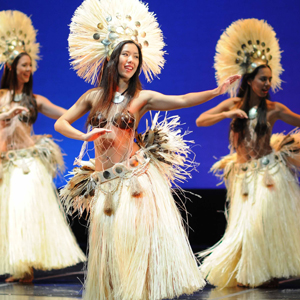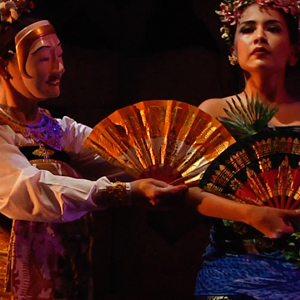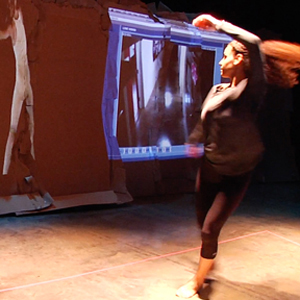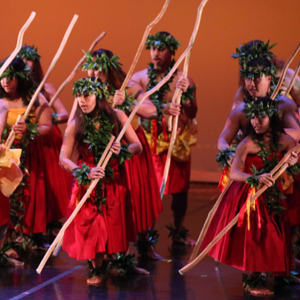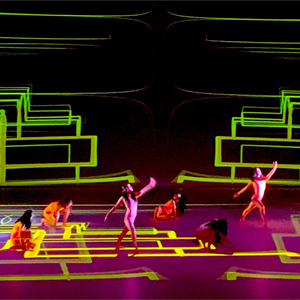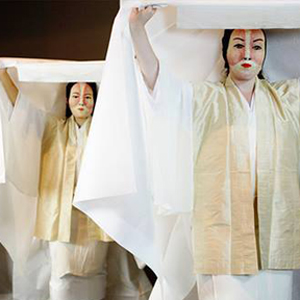Theatre Concentration MFA Focus Areas
MFA Theatre Concentration – Acting
The MFA focus area in Acting at UHM allows the serious acting student to study forms and methods from the broadest array available at any university.
We believe that an actor needs as many artistic tools as possible. The Acting curriculum at UHM allows the serious acting student to study forms and methods from the broadest array available at any university. Actors can study a range of world forms: realistic methods of acting for stage and camera, Hawaiian theatre, dance, puppetry, clown, classical roles, dialects, stage combat & weaponry, musical theatre, devised theatre, and a rich variety of Asian traditions including kabuki, kyogen, and noh from Japan, and randai and wayang listrik from Indonesia. Actors work regularly with the College of Nursing in the HealthCAST patient simulation program. Students leave UHM with the unique knowledge of how these styles and experiences intersect, intertwine, and inform the art of live performance. Nowhere else can actors get the breadth and depth of theatrical experience found in the Acting focus area at UHM.
MFA Theatre Concentration – Design
The Design focus area at UHM is a small, personalized, multicultural curriculum that emphasizes hands-on training, varied design and teaching opportunities, individualized mentoring with professionally active faculty, and design prospects with area theatres.
MFA design students primarily concentrate on one of three disciplines—scenic, lighting/electrics, or costume design – and may also choose to have a secondary area of focus.
We believe that design education should be hands-on, and does not stop at the classroom walls. It’s better to see it than talk about it. It’s better to do it, than to see it. Few other universities of this size can offer the complex and robust production season found at UHM, with numerous opportunities to apply skills learned in class to staged productions. Students who take full advantage of their training and design opportunities will graduate with a resume and portfolio for which they can be proud.
UHM Theatre and Dance provides a unique opportunity to learn and design for a wide variety of production styles. Please visit other parts of this website to learn about our wonderful array of specialized theatre disciplines. The design focus area supports all these other areas, giving our students a wide range of exposure to genres and styles, and tremendous opportunity for practical experience.
Our faculty are not only educators, but also practicing professionals, respected in their fields, who are encouraged to maintain professional careers and contacts beyond the university. These outside endeavors allow our faculty opportunities to continually develop and stay current in their fields, and also bring invaluable credibility into the classroom by sharing their real-world experiences.
Whenever possible, MFA design students are given the opportunity to gain formal teaching experience – invaluable for the educational theatre job market. These students, under applicable faculty guidance, help to train other students in the shops during production builds, mentor undergraduate design students, and also have the potential to be guest lecturers, teaching assistants, and instructors for appropriate classes.
Because of the Design focus area’s unique multicultural training, our graduates stand out in the job market. Our graduates have found work across the nation in design, technical, and other production positions for regional and semi-professional theatre, as well as teaching and designing for reputable colleges and universities.
MFA Theatre Concentration – Directing
The Directing focus area at UHM is designed to give students the practical and theoretical tools to not only stage productions but to conceive whole worlds that will not soon be forgotten.
Depth, balance, rhythm, emotion, intelligence, supreme openness to others, and a focus on the human being at the center of the art form – directors are responsible for all these essentials. Consequently, collaboration is key to a successful directing career in academia and beyond. The director’s vision must be crystal clear yet still leave room for the imagination of actors, designers, and audiences alike. Rigorous explorations of history, dramaturgy and cultural anthropology enhance the director’s craft, giving rise to a mode of self-expression that is as unique as it is powerful. UHM offers students the opportunity to draw on a wide variety of approaches from Hawaiian, Pacific, Asian, and Euro-American traditions. Lastly, it is our sincere hope that our students will become invaluable leaders and community-builders as we firmly believe that the spirit of entrepreneurship goes hand-in-hand with social responsibility.
MFA Theatre Concentration – Hawaiian Theatre / Hana Keaka
The MFA focus area in Hawaiian Theatre includes courses on the history of theatre in Hawai‘i, the study and analysis of indigenous Hawaiian theatre, and training in both traditional and contemporary Hawaiian performance forms. Past students have created qualifying and final creative projects in areas such as directing, playwriting, acting, or design—all with a focus on creating new work that reflects and honors the language, traditions, history, and values of the Hawaiian community.
A primary focus of the program is to grow practitioners of hana keaka; actors, playwrights, directors, designers, technicians, and patrons in order to grow the profession of hana keaka. Through the vision and intentions of Ka Hālau Hanakeaka, a Hawaiian-medium theatre troupe founded by Hailiʻōpua and Kaliko Baker, coupled with the curriculum and productions of the Hawaiian Theatre Program, our hui continues to serve the community and build capacity in the discipline of Hawaiian theatre. Ua ao Hawaiʻi, ke ʻōlino nei.
MFA Theatre Concentration – Playwriting
While learning dramatic structure, dramaturgy, and collaborative play development, students in the MFA playwriting focus area are encouraged to find their own individual voice as upcoming playwrights.
The art and craft of playwriting taught at UHM nurtures new and innovative works based on Hawai‘i’s diverse cultural heritage, and a distinct sense of place. Opportunities for play development through devised theatre practices are provided and encouraged. Works-in-progress are given regular public readings followed by lively discussions with audiences. Final creative projects have the opportunity to be staged in the Earle Ernst Lab Theatre.
MFA Theatre Concentration – Theatre for Young Audiences (TYA)
The TYA focus area encourages the development and pursuit of wonder, combining a foundational emphasis in drama education and curriculum development with the bold theatrics of puppetry, mask, clown, and dance.
Within the flexible framework of the TYA focus area, students can specialize in a wide variety of disciplines – acting, curriculum, directing, playwriting, and puppetry – all with the goal of capturing the imagination of young audiences. We believe in an expansive understanding of TYA that should be seen on the stage, used in the classroom and sent to our world. These core values – production, instruction, and service – are fundamental to all aspects of the program.
Through breathtaking productions, the TYA focus area celebrates the exhilaration of live performance. Thousands of children, young adults and families have entered doors of Kennedy Theatre to be ushered into magical worlds beyond. Productions have ranged from classic fairy tales, to adaptations of children’s literature, to new works by students, faculty, and guest playwrights. These offerings are filled with adventurous theatrical designs and styles, often combining elements of musical theatre, dance, puppetry, mask, and Asian and Hawaiian theatre techniques. The TYA focus area rejects a diminutive notion of ‘children’s theatre’ as a lighter, lesser, inferior cousin of ‘serious theatre.’ Instead, we believe that TYA productions should strive for the highest level of artistic expression possible in every single aspect of the production.
Students in the TYA program seek to augment the power of teaching and heighten the results of student learning by exploring the techniques of dramatic practice in the classroom. This foundational emphasis situates the focus area at the intersection of theatre and education, at the crossroads of dramatic practice and childhood development, at the nexus of life and play.
We also believe that theatre is not only a source of delight for human flourishing, but can be used as a tool for transformation. Seeking to offer real world experience alongside theoretical components of study, the TYA focus area offers internships at local performing arts organizations and opportunities to serve local and global communities through the uses of “applied theatre” techniques.
Asian Theatre Curriculum and Performance at UHM – a legacy of excellence
Students can pursue Asian theatre training and coursework as part of their MFA studies.
The program’s centerpiece are our training residencies, in which students have the exciting opportunity to undergo long-term, intensive training in a traditional Asian theatre form with renowned master artists of the genre, who provide rigorous training in semester-long movement, voice, and instrumental courses, as well as individualized instruction in the performance of specific roles and instruments.
Widely recognized as the finest university-based center for the study and practice of Asian performance in the world, the Asian Theatre program’s international reputation attracts students from Europe, Asia, the Pacific region, and North America. We offer students an extensive Asian theatre curriculum taught by two full-time Asian Theatre faculty members, and frequent short-term guest-taught workshops in a wide variety of Asian theatre genres. The program’s centerpiece are our training residencies, in which students have the exciting opportunity to undergo long-term, intensive training in a traditional Asian theatre form with renowned master artists of the genre, who provide rigorous training in semester-long movement, voice, and instrumental courses, as well as individualized instruction in the performance of specific roles and instruments. Currently the theatres of Japan and Indonesia are regularly featured in a four-year cultural rotation that often includes an additional Asian culture; frequently-taught forms are kabuki, kyogen, noh, randai, and wayang kulit. Residencies culminate in an English-language production of a representative major play, presented on the Kennedy Theatre Mainstage. These master-artist training residencies essentially “bring the field to the university,” enabling a multifaceted, integrative course of study that is truly unique. They have also produced some of the most outstanding Asian theatre productions to be seen outside their respective countries of origin. Since 1923, the Asian Theatre program has produced numerous world-premiere English-language productions of traditional and modern Chinese, Japanese, Indonesian, Malaysian, Korean, Indian and Thai theatre, as well as original, experimental works based on or influenced by research and training in specific genres of Asian theatre.
We offer more Asian theatre courses and integrate more Asian theatre training and performance than any other program in the US, with undergraduate and graduate courses in Asian, Chinese, Japanese, and South and Southeast Asian theatre history, theory, dramatic literature, and performance practice (e.g., acting, directing, puppetry), as well as multiple individual-study options. Our award-winning faculty is widely recognized around the world for their scholarship, creative work, and residency design and direction. To date the program has produced over ninety masters and doctoral graduates in Asian theatre, who are now working in Asia, North and South America, Europe, Australia, New Zealand, and Africa, as college and university teachers and administrators, and as theatre professionals.
We believe strongly in partnering with the community and regularly present scenes and lecture-demonstrations at schools, libraries, and other community institutions; in addition, several productions have toured the neighbor islands and the U.S. mainland. Our unique English-language productions of traditional Asian theatre are appreciated in their countries of origin, as well—three jingju productions have toured China at Chinese invitation, and the randai productions, the only instances of traditional randai being performed outside of Indonesia, have been invited to tour Sumatra.
For further information, please contact:
- Director of Graduate Studies in Dance, Kara Jhalak Miller (jhalak.miller@hawaii.edu)
- Director of Graduate Studies in Theatre, Lurana O’Malley (omalley@hawaii.edu)

